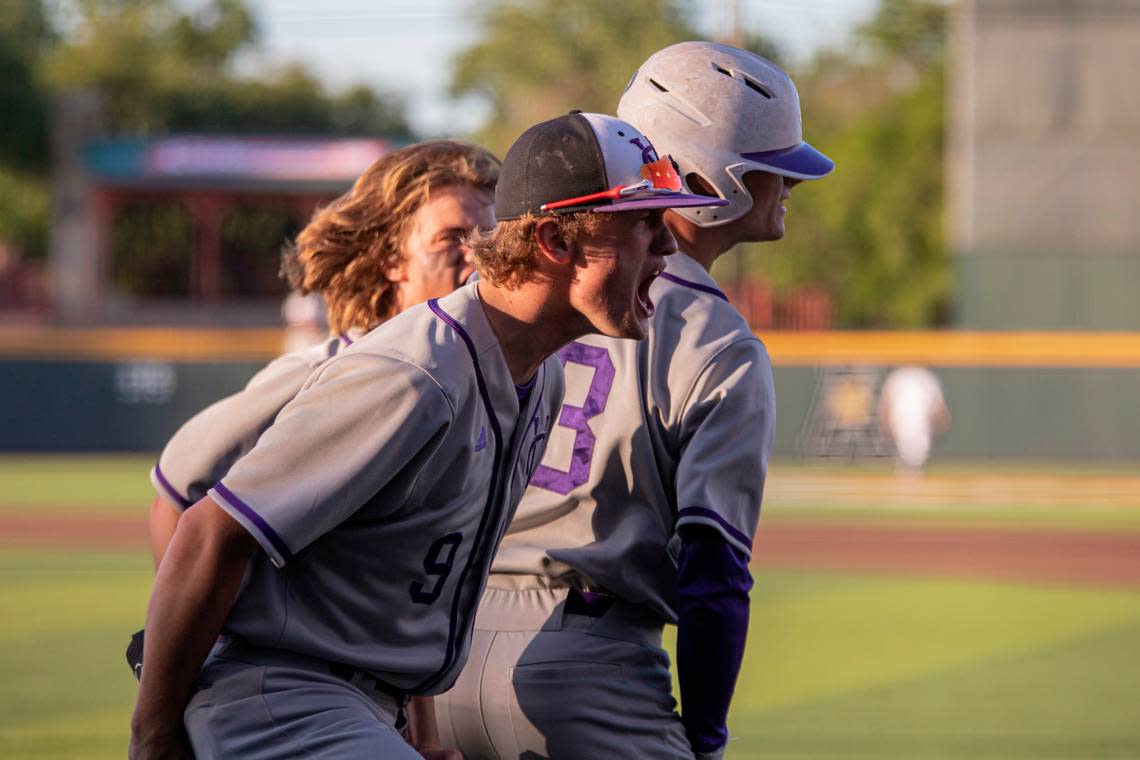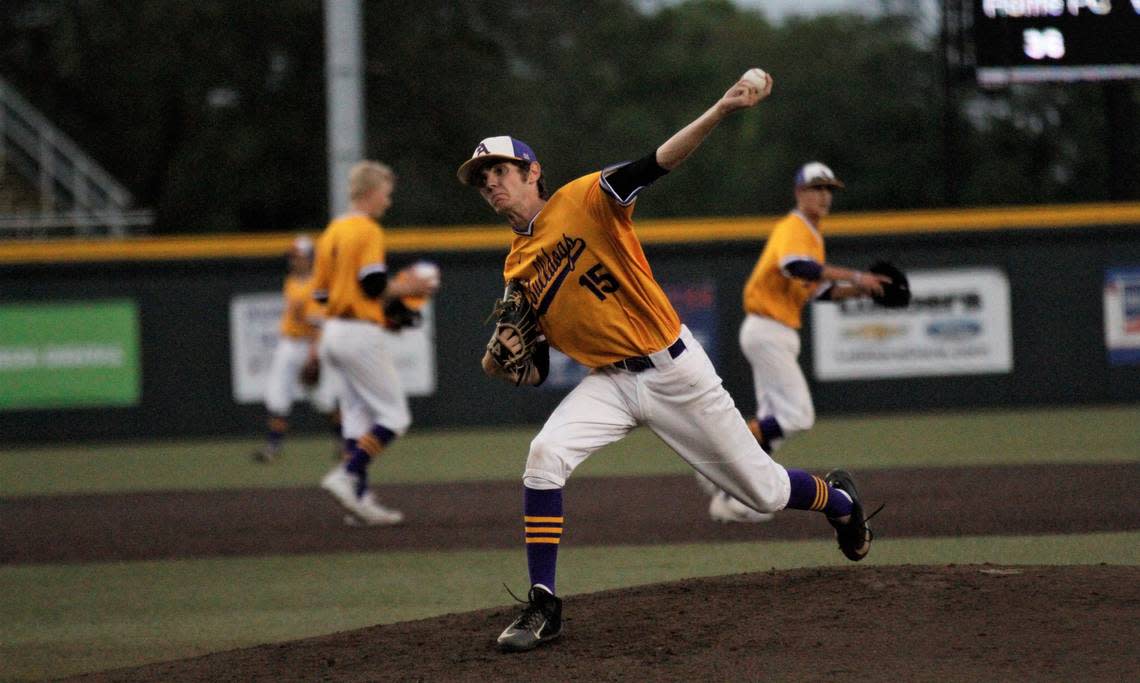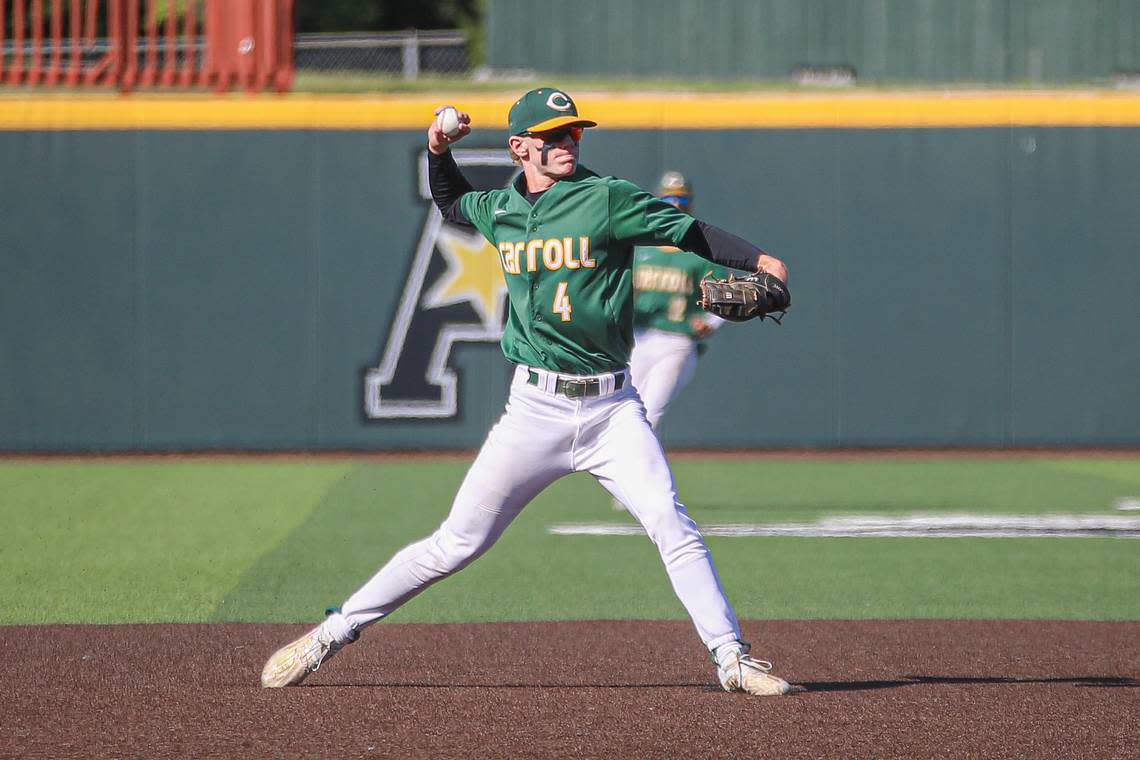Kansas high school baseball coaches frustrated after KSHSAA vote blocks expanded season
Frustration is bubbling among Kansas high school baseball coaches after their proposal to expand the regular season, a change they argue would modernize the sport in the state, recently failed to pass a vote by the KSHSAA Board of Directors.
The proposal would have allowed but not forced varsity teams to schedule up to 26 regular-season games, up from the current maximum of 20. Currently every bordering state plays more regular-season games than Kansas with teams in Oklahoma, Missouri and Nebraska teams capable of playing more than 30 regular-season games.
The increase received 87% approval from 170 Kansas baseball coaches who voted in the fall of 2021, but the same rule change presented to the KSHSAA Board of Directors on April 27 came up just short, 33 to 32, with a voting body composed of mostly principals, assistant principals and athletic directors from around the state.
The disconnect between the coaches trying to “modernize” the sport in Kansas and the administrators who ultimately decide if change can occur has left many coaches miffed.
“We feel strongly that this is in the best interest for our sport moving forward, so coaches are frustrated because we feel like the people in administration positions are not listening to their employees,” Olathe West coach Rick Sabath said.
“You’ve just got a lot of people who are stuck in their ways,” said McPherson coach Heath Gerstner, who is also the president of the Kansas Association of Baseball Coaches. “We’ve got too many people who are in the habit of saying ‘nope’ all the time.”

‘If we don’t modernize, we’re going to lose them’
The Sunflower League submitted the proposal because its member schools, located in the Kansas City metropolitan area, are starting to see a shift in focus away from high school sports.
It’s a rarity for the best soccer players to compete for their high school; instead they’re training with their club team. A handful of the top volleyball players are beginning to follow suit, choosing their club team over their high school team. Baseball players could be next, coaches worry.
“I don’t know about everybody else, but up here in the KC metropolitan area, we’re fighting for high school sports right now,” said Olathe West principal Jay Novacek, the Sunflower League representative on the KSHSAA Board of Directors. “I want high school sports to be important and I want kids to continue to play them because I believe they are a very, very integral part of the high school experience. My fear is if we don’t modernize them into the 21st century, we’re going to lose them.”
Since 1965, Kansas high school baseball teams have played the same 20-game, regular-season schedules for nearly six decades.
With every neighboring state increasing its amount of games over the years, Kansas coaches believe it’s time for their state to follow suit. Coaches believe Kansas players being limited compared to players in bordering states impacts them being recruited out of high school.
“Colleges will tell you if they’re looking at a kid from Kansas and at a kid from Oklahoma and they’re about the same, they’re taking the kid from Oklahoma because he’s more experienced,” said McPherson coach Heath Gerstner, president of the Kansas Association of Baseball Coaches.
Gerstner had an example from just this season at a recent tournament when McPherson played Carl Albert, a team from Midwest City, Okla. It was the 13th game of the season for McPherson, while the Oklahoma team was on Game No. 33. Carl Albert won the game 16-8 on April 28.
“We had four or five colleges in attendance and I guarantee you that those guys looked more polished,” Gerstner said. “But you think how many more games they’ve played and how many more at bats and inning pitched their kids have had. It’s just mind boggling that we keep shutting (expanding the season) down.”

‘When you don’t extend the season, that just becomes too tight’
The disconnect between Kansas baseball coaches and Kansas administrators appears to be centered around adding games without expanding the length of the regular season.
At least that was the hang up for Wichita Northwest principal Eric Hofer-Holdeman, who said he believed his concern was shared by many who joined him in voting against the proposal last month.
“You’re looking at six extra games, so 42 extra innings in a season in the same amount of time, I was worried about the arms,” Hofer-Holdeman said. “Especially here in Wichita, where a lot of teams only have one or two quality starters. The proposal came from the Sunflower, which I understand has tons of pitching in the KC area. So I get where they’re coming from, I really do, but ultimately it came down to the number of arms available and when you don’t extend the season, that just becomes, in my opinion, too tight.”
When relayed that hesitation from administration, coaches pushed back that it was made abundantly clear the proposal would expand the regular season to 26 games on a voluntary basis, not a mandated one. Regional seedings would be sorted by winning percentage under the proposal.
“In talking to our Missouri brethren during the research, we learned that if teams don’t feel like they have the pitching, then they just won’t schedule the full amount of games,” Lawrence coach Brad Stoll said. “If you’re in Liberal or Garden City and it’s tough to get that many games because of travel, then just don’t schedule 26 games. But for us in more populated areas, we can get 26 easily and we could play Tuesday, Thursday, Saturday for the entire season. It’s not a mandated deal, it’s just affording those who want the opportunity to do it.”
Administration who opposed the proposal saw potential problems the additional games could cause with players and parents of teams who might choose not to play the additional games.
“It might be optional, but in reality and in practice, schools are going to feel compelled to do it or be left behind by the schools that are doing it,” Hofer-Holdeman said. “If my team is only playing 20 games and your team is playing 26 games, then you’re going to have an advantage over me.”
Coaches from the Northeastern part of the state argue that is already happening.
“We feel like it’s a detriment to the development and opportunities for our kids to be seen when the Missouri kids are playing almost twice as much as we are,” Stoll said. “If you’re a kid and can go to SM East and play 20 games or go two miles down the road across the state line and Rockhurst is playing 36, what do you think is going to happen?”
The additional games would allow teams with pitching depth to spread around innings, a problem Bishop Carroll coach Charlie Ebright has run up against for years in the City League. He also said it would give smaller-school teams the opportunity to develop more pitching with additional games.
“We play in a lot of run-rule games and I’ve got four good starters and I can’t get them innings,” Ebright said. “Seriously, I’ve got guys going down pitching on JV or C-team just to get innings. I know not every school would want to play 26 games, which is OK, but I think it makes sense for the teams with kids who want to play in college to open it up.”
Many coaches feel like baseball is a game of repetition and should be played more than practiced. Often it feels like the other way around in Kansas.
“We just went 13 days without playing a game,” Ebright said. “It’s like we practice, we practice, we practice and then we finally play. Think about it: if you just play in 10 doubleheaders, you’re only putting on the uniform 10 times the whole regular season, which I think is ridiculous for high school baseball.”

‘If we say yes, it would open up a can of worms’
Another major concern for Kansas administrators is the kind of precedent they would be setting if they accept the proposal to expand the regular season for baseball.
Wichita Northwest principal Eric Hofer-Holdeman said that very much factored into why he voted against the proposal last month.
“If we say yes to an expanded season for baseball, then you darn well know the basketball coaches, the soccer coaches, the volleyball coaches are going to be asking for more games,” Hofer-Holdeman said. “If we say yes, it would open up a can of worms. And I don’t think that’s the avenue that we want to go down as a state.”
Olathe West principal Jay Novacek, who introduced the bill to the KSHSAA Board of Directors, argues expanded seasons might be the only way high school sports survive against club teams, particularly for Kansas City schools.
He would love to see a shot clock introduced to high school basketball, for basketball teams to play in holiday tournaments, for the baseball state tournaments to all be played in a central location — like Riverfront Stadium in Wichita.
“I didn’t say this during the meeting, but I wanted to say that I absolutely hope those coaches do ask for more,” Novacek said. “We need to modernize and protect the integrity of high school sports in Kansas. The problem is there are so many people in the room who live in such vastly different parts of the state that oftentimes it’s hard for people to see things through other perspectives. And that goes both ways.”
Some administrators pondered if there would be Title IX issues without expanding opportunities for softball, but the Kansas Softball Coaches Association declined the opportunity to join the proposal, according to Novacek. KSHSAA executive director Bill Faflick confirmed to administrators before last month’s vote that there would be no Title IX implications to accepting the baseball proposal.
The fact that the proposal carried such support from coaches but was still denied by administrators left many coaches disillusioned with the process.
“I guess Kansas will kind of be mired in mediocrity when it comes to the way we do things,” Bishop Carroll coach Charlie Ebright said.
“The easy answer for people is always to say no to something,” said KABC president Heath Gerstner, who is also McPherson’s coach. “Instead of saying yes and making a change for the better, they took the easy way out and just said no.”
